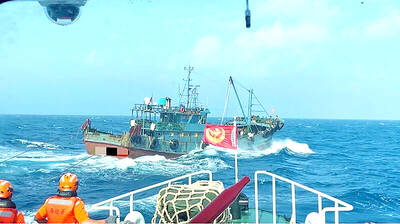National Taiwan University (NTU) has approved a proposal to set up an international semiconductor program starting next year.
The university would recruit an initial 25 students from overseas, and after a two-year pilot period, the four-year bachelor’s degree program would be open to 50 foreign students a year, said the proposal, which was approved at a school affairs meeting on Saturday.
NTU said that the program proposed under the Act for National Key Fields Industry-University Cooperation and Skilled Personnel Training (國家重點領域產學合作及人才培育創新條例) aims to introduce more foreign talent to Taiwan’s high-tech industry.

Photo: CNA
Students who graduate — a requirement of which is to pass a Mandarin proficiency test equivalent to the Common European Framework of Reference for Languages B1 level — can continue their studies at other research institutes established under the act or at semiconductor-related graduate schools, NTU said.
While the program is expected to incorporate “academic capacity” from the College of Engineering, the College of Science, the College of Bioresources and Agriculture, and the College of Electrical Engineering and Computer Science, students from those colleges can be assured that the program would not take resources away from them, NTU officials said.
NTU president Chen Wen-chang (陳文章) said concerns would be discussed at the next school affairs meeting, and that a formal application for the program would be submitted to the Ministry of Education.
Taiwan produces 90 percent of the world’s most advanced semiconductors, with the success of Taiwan Semiconductor Manufacturing Co (TSMC, 台積電), the world’s largest contract chipmaker, often coveted by other nations amid global supply chain challenges caused by the COVID-19 pandemic and geopolitical tensions.
Also at Saturday’s meeting, the university approved a proposal to establish a college of international political economy, despite student and faculty representatives voting in October to shelve plans for it due to concerns about how it would be funded.
The latest motion passed with 111 votes in favor and five against, Chen told reporters after the meeting.
The college could start offering master’s degree programs in 2025 and would feature all-English courses and potentially a dean recruited from an internationally renowned institution, he said.
Multiple enterprises, including Fubon Financial Holding Co (富邦金控), Cathay Financial Holding Co (國泰金控) and TSMC, have agreed to provide funding for the college, he said.
There were initially concerns that businesses funding the college would try to influence areas such as the hiring of teachers or how courses are taught.
A proposal for a similar college was brought up by former NTU president Yang Pan-chyr (楊泮池) in 2016, but it was eventually abandoned as students opposed its tuition fee of NT$20,000 a year.

The Ministry of the Interior (MOI) is to tighten rules for candidates running for public office, requiring them to declare that they do not hold a Chinese household registration or passport, and that they possess no other foreign citizenship. The requirement was set out in a draft amendment to the Enforcement Rules of the Public Officials Election and Recall Act (公職人員選舉罷免法 ) released by the ministry on Thursday. Under the proposal, candidates would need to make the declaration when submitting their registration forms, which would be published in the official election bulletin. The move follows the removal of several elected officials who were

The Republic of China (ROC) is celebrating its 114th Double Ten National Day today, featuring military parades and a variety of performances and speeches in front of the Presidential Office in Taipei. The Taiwan Taiko Association opened the celebrations with a 100-drummer performance, including young percussionists. As per tradition, an air force Mirage 2000 fighter jet flew over the Presidential Office as a part of the performance. The Honor Guards of the ROC and its marching band also heralded in a military parade. Students from Taichung's Shin Min High School then followed with a colorful performance using floral imagery to represent Taiwan's alternate name

COGNITIVE WARFARE: Chinese fishing boats transmitting fake identification signals are meant to test Taiwan’s responses to different kinds of perceived incursions, a report said Chinese vessels are transmitting fake signals in Taiwan’s waters as a form of cognitive warfare, testing Taipei’s responses to various types of incursions, a report by the Institute for the Study of War said on Friday. Several Chinese fishing vessels transmitted fake automatic identification system (AIS) signals in Taiwan’s waters last month, with one mimicking a Russian warship and another impersonating a Chinese law enforcement vessel, the report said. Citing data from Starboard Maritime Intelligence, the report said that throughout August and last month, the Chinese fishing boat Minshiyu 06718 (閩獅漁06718) sailed through the Taiwan Strait while intermittently transmitting its own AIS

CHINESE INFILTRATION: Medical logistics is a lifeline during wartime and the reported CCP links of a major logistics company present a national security threat, an expert said The government would bolster its security check system to prevent China from infiltrating the nation’s medical cold chain, a national security official said yesterday. The official, who wished to stay anonymous, made the remarks after the Chinese-language magazine Mirror Media (鏡周刊) reported that Pharma Logistics (嘉里醫藥物流) is in charge of the medical logistics of about half of the nation’s major hospitals, including National Taiwan University Hospital and Taipei Veterans General Hospital. The company’s parent, Kerry TJ Logistics Co (嘉里大榮物流), is associated with the National Committee of the Chinese People’s Political Consultative Conference (CPPCC) and the Chinese People’s Liberation Army (PLA), the